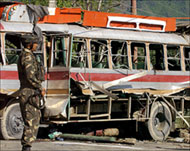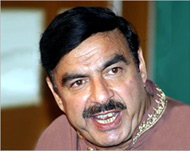Indian troops die in Kashmir bus blast
At least nine Indian soldiers have died and 12 wounded in a powerful car bomb explosion in Srinagar, the capital of Indian-administered Kashmir.

The blast on Friday also injured three civilians including two crew members of a bus carrying the soldiers back to their duty in the Himalayan state after taking leave.
An Indian Army spokesperson, Colonel Vijay Kumar Batra, said three soldiers died instantly. Six of the seriously wounded soldiers died soon after they were admitted to a nearby army hospital.
The explosion occurred outside the Mughal garden Nishat overlooking the popular Dal lake tourist site at 4pm (local time).
The soldiers of India’s counterinsurgency 13 Rashtriya Rifles were en route to their unit in Ganderbal, 28km north of Srinagar, when Muslim fighters struck their convoy.
Explosive-laden car
The fighters apparently triggered an improvised explosive device (IED) inside a Suzuki car using a remote control. The car was parked at the side of the road about 20 yards from a paramilitary police camp. The road-opening party of the army, driving ahead of the convoy, did not detect the IED-laden car.
 |
|
An Indian Army soldier guards |
The public transport bus had been hired by the army to carry soldiers back to duty. It bore the full impact of the explosion. The car, witnesses said, was reduced to melted steel. Some vehicles passing through the area at the time and a few shops were also damaged.
The army said the driver and conductor of the bus, and a local photographer who sustained injuries in the blast, were fighting for their lives.
Casualties removed
Soldiers from the convoy cordoned off the area and, with the help of paramilitary troopers patrolling the area, removed their dead and injured colleagues to the Indian army hospital at Badamibagh where its 15 Corps headquarters about 5km from the scene.
“Three jawans were fatally injured and were declared brought dead whereas six of the 17 others admitted to the base hospital succumbed soon thereafter,” Colonel Batra said.
Kashmir’s main indigenous separatist group Hizb al-Mujahidin admitted carrying out the attack, though the claim could not be verified.
“We did it,” a caller, who identified himself as a spokesperson of the Hizb al-Mujahidin, told local news agency CNS.
Accusations
 |
|
The blast shook holidaymakers |
Hizb al-Mujahidin’s Pakistan-based supreme commander, Syed Salahuddin, had earlier this week accused the Indian government of being insincere in seeking a peaceful settlement of the Kashmir dispute with Pakistan and the Kashmiri separatists threatened that the armed struggle in the disputed state would intensify until victory.
Friday’s blast caused panic among hundreds of Indian and foreign tourists visiting the Nishat gardens, an area of terraced land overlooking Dal lake, and those enjoying shikara (gondola) rides on its waters.
The tourism industry, which suffered severely following the outbreak of violence in Kashmir 16 years ago, has started to pick up following talks between India and Pakistan earlier in the year.
Permission refused
 |
|
Ahmed intended visiting Srinagar |
Meanwhile, India on Friday refused permission for Pakistan‘s information minister, who once sheltered Kashmiri separatists, to visit Kashmir.
Sheikh Rashid Ahmed had applied to travel to Srinagar, on the next cross-border bus, next week.
Reacting to the visa refusal, relatives of the minister in Indian Kashmir said they were disappointed.
“We’re quite upset over it,” said Shaikh Farukh, a cousin of the Pakistani minister. Farukh said he had spent about 50,000 Indian rupees ($1100) in anticipation of the visit.
“Yes, I came to known about it through an Indian television channel this afternoon. And soon thereafter Farukh telephoned me to say in a choked voice that his heart had been broken,” said Shaikh Abd al-Salaam, Rashid Ahmed’s uncle.
The bus service began in April to reunite families divided by half a century of war and rebellion, as part of a peace process after India and Pakistan came close to war in 2002.